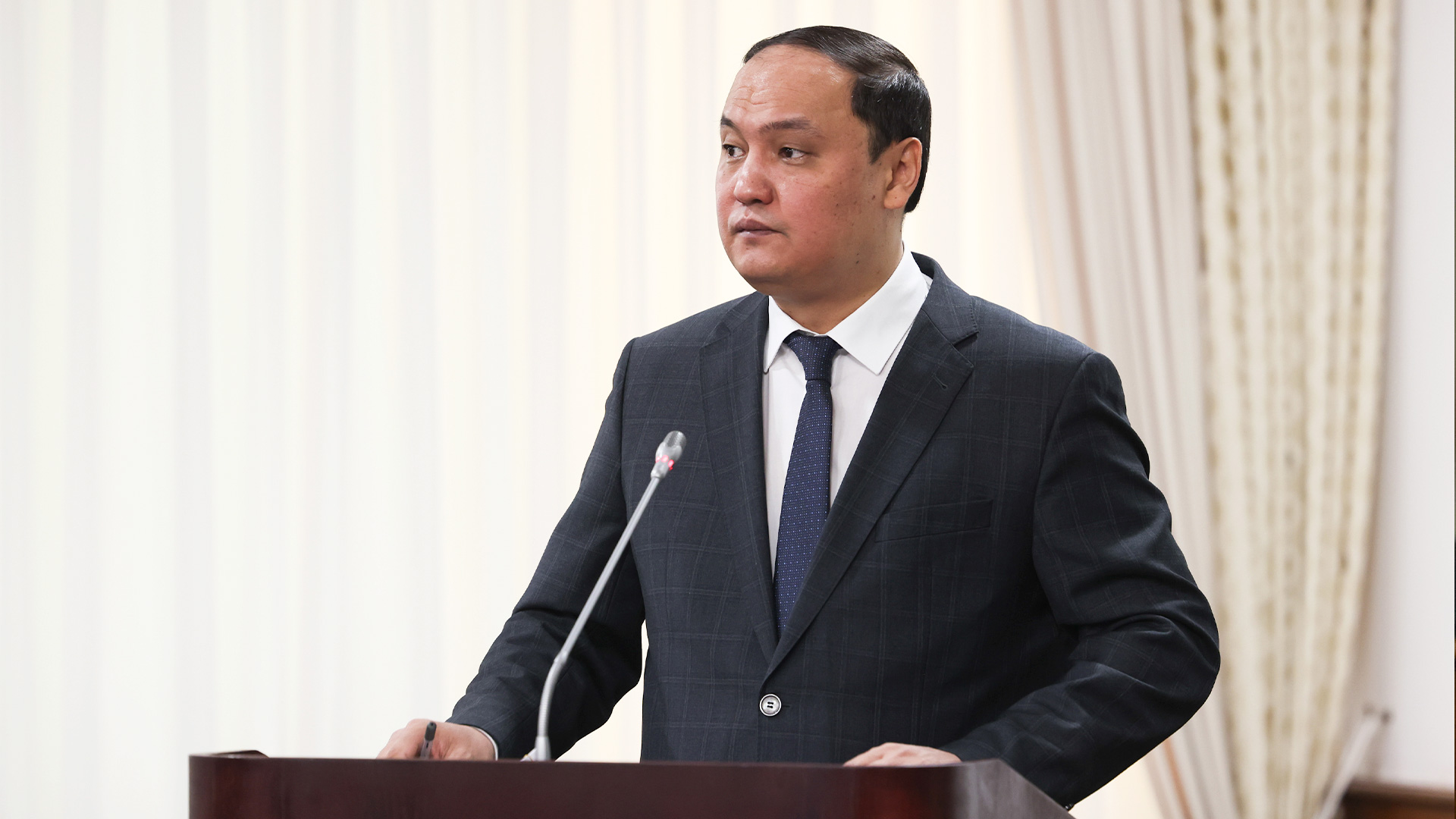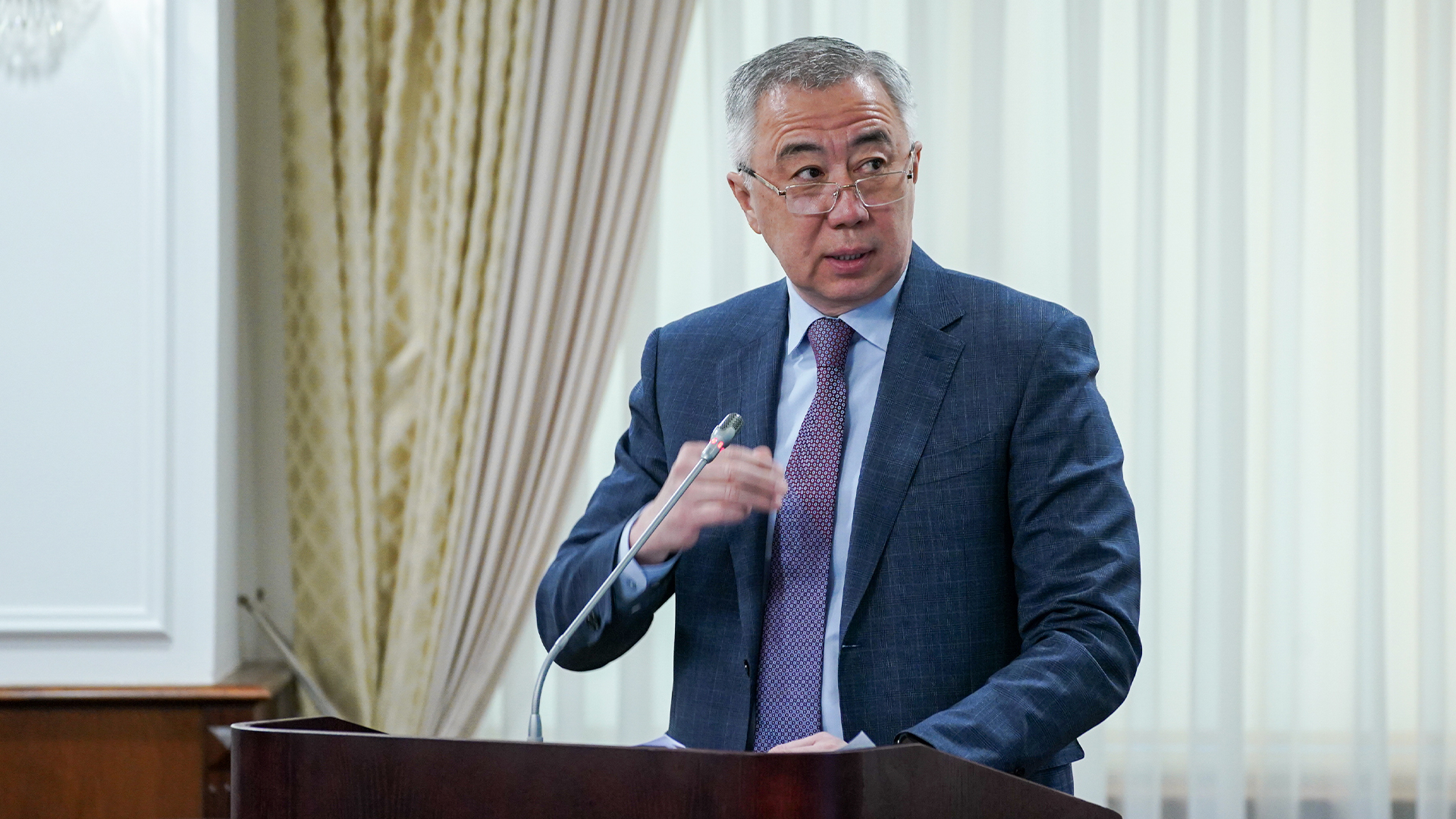02 May 2023, 12:48
 At the Government session chaired by Prime Minister Alikhan Smailov the progress of the Food Security Plan for 2022-2024 was considered. Reports were made by Deputy Prime Minister – Minister of Trade and Integration Serik Zhumangarin, Minister of Agriculture Yerbol Karashukeyev.
At the Government session chaired by Prime Minister Alikhan Smailov the progress of the Food Security Plan for 2022-2024 was considered. Reports were made by Deputy Prime Minister – Minister of Trade and Integration Serik Zhumangarin, Minister of Agriculture Yerbol Karashukeyev.
As informed the Minister of Agriculture Karashukeyev, the Food Security Plan for 2022-2024 provides for 31 measures, including 17 to increase production, development of agricultural science and storage of goods, 7 to stabilize prices for food products, 7 for safety and quality of food products.
Out of 31 measures 11 were implemented in 2022 and 20 measures are envisaged for 2023-2024.
In general, by the end of 2022 the volume of food production grew by 3.9% to 2.9 trillion tenge. In this case, there is an increase in the production of major food products: vegetable oil, flour, pasta, cereals, sausages and sugar.
At the same time, there is a number of products, production of which decreased, and it is mainly dairy products: butter, milk, cheese and cottage cheese, sour-milk products.
"Provision with own production in 2022 increased from 56.4% to 61% for sausages, 73.7% to 75.6% for apples, 65.4% to 68% for poultry, 42.6% to 51% for sugar. At the same time there is a decrease in cheese and cottage cheese from 56% to 53%. Thus, again, there is a decrease in dairy products. This confirms the fact that today it is problematic the production of dairy products, due to underdevelopment of raw materials," the Minister of Agriculture said.
For production of milk products the project on replication of positive experience of North Kazakhstan region in subsidized financing of construction of large commodity milk farms through regional agricultural cooperatives is realized. As a result of implementation of the project domestic dairy plants will be provided with quality raw materials and import dependence on milk will be significantly reduced.
For these purposes for 2023 it is planned to allocate 100 billion tg for creation of 65 dairy farms with production capacity of 373 thousand tons of milk a year.
According to the minister, plans for the following years to build additional 50 dairy farms, which requires 113 billion tenge.
"By main types of vegetables we fully meet the needs of the domestic market. So, in 2022 we produced 4.1 million tons of potatoes, 621 thousand tons of carrots, 1.1 million tons of onions and 551 thousand tons of cabbage. Despite the significant volume of production of horticultural products, due to the lack of storage capacity in winter and spring, there is a decrease in the supply of domestic vegetables in the market. This leads to an increase in imported products on the market and higher prices in the off-season period. The solution to this problem is to increase storage capacity of vegetables, which will allow to keep and sell part of domestic products in the off-season," Karashukeyev explained.
Today, in the republic there are 1 208 vegetable storehouses with a total storage capacity of 1 952,8 thousand tons, including 770 vegetable storehouses, 382 potato storehouses and 55 fruit storehouses.
In order to increase the storage capacity of vegetables approved Comprehensive Plan for the construction and modernization of vegetable storage until 2025.
In the framework of the Complex plan during 2021-2022 37 projects with a total storage capacity of 200,8 thousand tons were realized with 181,5 thousand tons plan. Thus, the planned indicators are fulfilled by 110%. Until the end of 2023 planned to implement 29 projects for 111.5 thousand tons of products.
Thus, to establish the real picture on provision of storage facilities the Ministry jointly with the Ministry of Trade and Integration and the akimats of regions will conduct an audit of all storage facilities with division into categories, based on which plans for the construction of storage facilities for 2023-2025 will be reviewed upwards.
In addition, within the framework of the ongoing work on the reform of state support, work is carried out to increase the proportion of compensation for investment from 25% to 50% in the construction of modern storage facilities with special equipment, providing long-term storage of products while preserving their commodity qualities.
 In turn, Deputy Prime Minister – Minister of Trade and Integration Serik Zhumangarin said that, based on the total consumption of the entire population of the country, the main import-dependent products today are sugar, chicken meat, cheese and cottage cheese, butter, sunflower oil, pasta, cabbage and onions during the off-season.
In turn, Deputy Prime Minister – Minister of Trade and Integration Serik Zhumangarin said that, based on the total consumption of the entire population of the country, the main import-dependent products today are sugar, chicken meat, cheese and cottage cheese, butter, sunflower oil, pasta, cabbage and onions during the off-season.
Today, by the end of 2022, there is import dependence from 16.2% to 55.9% for 9 items of socially important food products and import dependence of sugar is more than 90%.
"For some products, we note the provision is much higher than the consumption of the country's population. However, we repeatedly encounter aggressive exports, especially for vegetable products. We need to build a policy to ensure the domestic market and resistance to crises in the food sector," Zhumangarin said.
We continue to coordinate the work on market saturation with stocks formed within the existing mechanisms of price stabilization. Timely measures of tariff/non-tariff regulation gave positive effect this year.
Thus, as a result of introduction of customs duty on sunflower seed it was possible to stabilize prices for sunflower oil from producers. At present, the dynamics of sunflower oil price reduction is observed both at the processing plants and at retail outlets.
In order to prevent aggressive export of onions a ban was introduced for 3 months, which was replaced by quotas before the expiration of the ban. This measure allowed to provide the population with onions and leveled out the risk of a sharp rise in prices, as was the case in previous years for cabbage and potatoes.
As Zhumangarin noted, at present the work on contracting of autumn harvest of 2023 to provide for the off-season of 2024 is continuing. To date, formed about 90 thousand tons of products. Regions need to step up contracting for next year's off-season.
To ensure saturation of the domestic market in May-June of this year, the issue of supply of early imported vegetables is being worked out.
For today, SUE "Tajagropromexport" is ready to provide early onions in the volume of up to 50,000 tons.
To organize supply of early onions the Branch of KTZ Express JSC - KZTE Commerce is involved. This company will provide centralized purchase of onions, customs clearance, acceptance of goods and their distribution to regional agricultural companies.
Local executive bodies and regional agricultural cooperatives should pick up the goods from Saryagash station in a timely manner to ensure supply to the regions and price stability.
Also, together with UZKAZTRADE, the issue of buying cabbage from Uzbekistan was worked out, taking into account delivery cost of 130 tg/kg.
At the same time, early cabbage at a similar price is sold by farmers of Turkestan region. In order to support the wholesale of cabbage from Uzbekistan, the farmers refused to buy the cabbage. The information on cabbage producers has been communicated to all regions. It is expected that price of products from the field will continue to go down in May. To supply the market with early potatoes, we are working on deliveries from Pakistan and Uzbekistan.
Today, of all the storage facilities in the country, only about 200 vegetable storage facilities are equipped with climate-controlled equipment.
"While conducting an analysis to determine stocks, we faced the problem of lack of data to form a reliable commodity balance. In this regard, we have made a proposal to the Bureau of National Statistics to develop and implement a report on stocks in vegetable storage facilities. Local executive bodies were commissioned to conduct inventory of unregistered vegetable storage facilities followed by their registration and registration for tax purposes," Zhumangarin said.
Moreover, the Ministry of Agriculture, the Ministry of Trade and Integration and local executive bodies should divide vegetable storage facilities into categories. In the future it will allow to cover all vegetable storage facilities and receive reliable data on stocks in the country.
Also, a preliminary assessment of all storage facilities has been carried out, according to the results of which we see a significant deficit in storage capacity. And if we take into account only storage facilities that meet the requirements of modern storage formats, then the deficit will be much greater. According to the results of the inventory a comprehensive plan for the construction and modernization of vegetable storage facilities until 2025 will be finalized.
As the akim of the Atyrau region Serik Shapkenov informed, in order to stabilize the prices of socially important products in the region, including vegetable products, a set of measures is being implemented.
A total of 3.5 billion tenge is allocated to the Atyrau region stabilization fund, of which 2.9 billion tenge is provided to entrepreneurs on the turnover scheme and forward contracts, of which 1.8 billion tenge or 62% directly to commodity producers.
"On allocated funds purchased and sold 9.5 thousand tons of food products at prices below market by 15-20%. At present, the remaining means of the Stabilization Fund, contracts for the supply of vegetable products at the best price from other regions of the Republic of Kazakhstan and from abroad," the head of the region said.
Also, a number of projects to ensure food security are being implemented. This year, in Makhambet district, we launched a 4 hectares industrial-type greenhouse complex. By the end of the year it is planned to put into operation one more industrial greenhouse complex with the area of 5.6 hectares. Also the sown area of vegetable production is increased due to the turnaround scheme from 160 hectares to 300 hectares.
A total of 26 vegetable storage facilities operate in the region. This year their inventory was carried out, 10 warehouses equipped with climate control systems were selected and accounted for.
#Agriculture #Serik Zhumangarin"Currently 2 investment projects on the construction of vegetable storage facilities with a total capacity of 19 thousand tons are being considered. The implementation of these 2 projects will increase the capacity of storage facilities to 62.6% of the needs of the region," regional akim summarized.
Stay updated about the events of the Prime Minister and the Government of Kazakhstan - subscribe to the official Telegram channel
Subscribe